Editorial: Why is Samsung's Galaxy Fold graded on a curve?
Samsung Electronics is a multibillion corporation that leads the world in producing advanced displays, solid state storage and other components; builds an astounding array of home appliances— including the majority of the world's high end televisions— and has built smartphones for many years before iPhone even appeared. So why is the company handled like a small child when it makes sloppy, incompetent mistakes?
Despite being the world's largest producer of smartphones— it sold nearly 300 million in 2018— and broadly hailed for its pioneering innovation in variety of areas, including the production of what is generally regarded as the most advanced mobile OLED panels, Samsung manages to consistently embarrass itself in absurdly childish stunts and in rushed, junior-level engineering that erupts with catastrophic consequences at alarming regularity.
Yet rather than being chided to act more 'age appropriate,' criticism of the company is nearly nonexistent. Instead, no matter how recklessly the company sets up its own face-planting failures, the tech media is ready to rush to pick it up off the floor and wipe the blood of its face as if it were a helplessly young tyke trying to ride a bike for the first time.
Behold, the Samsung Galaxy Fold
Sometimes Samsung's sheer level of incompetence is astounding. Rather than just basking in the glow of exclusively supplying advanced, folded OLED panels for the most popular smartphone in the world— Apple currently has no other source for its highest end iPhone XS models— or seeking to incrementally perfect its own wrap around OLED premium Galaxy S models, Samsung decided that it needed to showboat with a design for a "smartphone" that folded its mini-tablet sized OLED display in on itself, creating a thick, heavy, and oddly narrow but extremely tall phone that converts into a relatively small tablet with a screen dominated by a notch.
From a practical standpoint, the Fold design was flatly stupid. Nobody wants a phone that looks and feels like two iPhone X models stacked on top of each other, but lacking the beautiful, full-screen experience that Samsung's own OLED helped enable. When "folded" shut, the Galaxy Fold presents only a small display (with room for only three app icons across) surrounded by huge bezels, and which is not even centered on the device.
Samsung Galaxy Almost Fold (@BeccaFarsace) pic.twitter.com/sg1AIswa9r
— Vlad Savov (@vladsavov) April 15, 2019
When unfolded, it turns into a tweener-sized tablet that doesn't have any more optimized tablet apps for it than any other Android tablet. And while marketing photos suggest that the unfolded Fold presents a huge, useful display area, the reality is that in the real world, tasks such as watching videos optimized for mobile playback result in massive black letterboxing bars that waste the entire point of having a larger display. It actually centers the video across its crease. As a mobile phone, Galaxy Fold is as absolutely ridiculous as trying to pick up kids and groceries in a Countach.
Despite being a silly, impractical consumer product, Galaxy Fold could have existed as a museum display piece. Yet instead of just putting it on a showroom shelf like an automotive concept car that's designed to enthrall your attention with its radical lines— rather than actually driving you around as a practical vehicle— Samsung set up the worst possible prelaunch stunt it could: it shipped hundreds of its nearly $2,000 prototypes out to Instagram influencers and firm-friendly bloggers and sat back to see what might happen.
To prepare itself, Samsung created a robotic folding clean room where Galaxy Fold devices were carefully opened and shut hundreds of thousands of times by contraptions that gripped the unit securely and handled it with precise, right angle perfection. The company apparently believed this was representative of how the device would be used in the real world by human hands in filthy environments.
Things did not go well
On day one, various Instagram influencers and bloggers at sites like the Verge and even the BBCoffered their giddy initial showroom impressions. "It really does feel quite robust," declared the BBC's Chris Fox after handling it for what could only have been minutes.
"When I unfolded the Fold for the first time I said 'Whoaaaaa' like a nerd and immediately wanted one though I cannot explain why," tweeted Wired's Lauren Goode. The answer: because you're not reviewing it as a product, you're fawning over a concept device that clearly nobody could or would want to use as their phone.
Dieter Bohn, in his Day One "hands on" for the Verge, made the obvious-in-hindsight mistake of going with the headline "Samsung Galaxy Fold: more than just a concept," as if he were perfectly cuing up Ron Howard's narrator from Arrested Development to provide the punchline, "It was not more than just a concept."
On day two, it seemed that everyone's Galaxy Fold started breaking in the kind of domino falling fashion that would be unbelievable as a plot device, even in a movie about hardware companies behaving with incredible incompetence. It would even be a bit groan-inducing to see such a scene acted out in an SNL sketch.
The Apologists of the Samsung Galaxy Fold
Yet rather than immediately branding the situation as #FoldGate and calling for the resignation of Samsung's product managers, its product designers and its CEO and demanding groveling apologies for having insulted the public with such jackassery, the people who Samsung shipped one (or multiple) Fold devices to play with started making excuses for the company as if it were an underdog trying to get its first real break in life.
Some had caused their own damage by peeling off the screen protection layer that was noted as not to be removed. That polymer layer itself nicks up and was already looking worn for many on day two. The device is also not water resistant, something few "reviewers" registering their glee about it didn't bother to mention in 2019.
But plenty of others witnessed the thin plastic display panel itself simply wear out within hours of delivery. Bohn depicted his "not just a concept" device creasing, bubbling up and ripping open on day two. He noted that it "developed a bulge that appeared to be the result of something in between the screen and the hinge."
However, Bohn's passive reaction to seeing his not-just-a-concept Galaxy Fold self-destruct without hours— and just days prior to the commercial launch— was rather submissively tepid. "Seeing such critical failures pop up ahead of the official launch isn't reassuring," he wrote, as if he were detailing a naked emperor's fine clothes with a saber of the court touching his neck.
Joana Stern of the Wall Street Journal just a few days ago dressed up as a butterfly to mock Apple over reports of keyboard problems on its MacBooks, demanding to know, "should $1,200 MacBooks be breaking due to dust and debris!? Absolutely not!"
But for Samsung, she didn't put on a costume, nor did she compare the $1,980 price of the Galaxy Fold to Apple's notebooks, nor wonder out loud if debris should ever cause damage to an expensive device. Nor did she offer any specific advice to Samsung's CEO.
Instead, she presented, without comment, Samsung's official statement, which minimized the problem as being "a few reports" from "a limited number of Galaxy Fold samples." And that occured just after her mocking of Apple's statement that "a small number of users were having issues" with the MacBook keyboard, a device that shipped to tens of millions of production users, not a few hundred influencer shills.
While she did earlier point out that dirty MacBook keyboards can be resolved with a can of air, or even using "Unshakey" a software utility designed to ignore repeating keys, that came shortly before recommending that users switch to a Microsoft Surface Book, a product with a poor reliability record. Last year, Consumer Reports called out Surface for "poor predicted reliability in comparison with laptops from other brands."
A can of air or some software isn't going to fix a Galaxy fold with a buckling crease and torn open holes in its OLED panel, but Stern didn't have anything to say about Galaxy Fold that might harm her relationship with Samsung.
Stern was also a leading apologist for Samsung during the Note 7 fires in 2016, suggesting that the botched rollout of its defective by design battery— and then the company's badly handled, multi-billion dollar recall— would have no affect on customers' perceptions of the company.
Instead, Stern and Geoffrey A. Fowler attempted to first minimize and then associate Samsung's bad design with Apple, writing that "there's no reason to believe other Samsung models are dangerous," shortly before citing an anecdotal story of an iPhone 7 that was also said to have caught fire in a posting on Reddit, a false equivalency that would embarrass any journalism student.
Stern had just stepped up to advise Apple's chief executive Tim Cook to give up the company's stance on consumer privacy and join Google and Facebook in engaging in massive data collection to exploit users with targeted tracking and profiling.
"While I applaud and appreciate your assurance of privacy," Stern told Cook in print, "my worry is that you simply can't afford to maintain that mentality when the competition has such a great advantage."
Yet I couldn't find any similar advice from Stern or anyone else at the Wall Street Journal chiding Samsung's executives by name over the boondoggle of Note 7 battery fires that year; or the gimmicky, failed face recognition and other flawed design choices of Galaxy S8 detailed by Neil Cybart of Above Avalon in 2017; or the high prices, low approval, and subsequent "lower than expected" sales that hit Galaxy S9 last year.
It's as if Samsung doesn't need any condescending advice from a blogger with a terrible track record of always being on the wrong side of tech history. Yet it's not just bloggers with cozy relationships to Samsung that sound like they are forced to make excuses for the company.
Notable Apple blogger John Gruber just tweeted, in a conversation about the double standard of how the media handles Apple compared to Samsung, that "Apple does not make what I'm calling 'boutique phones.' Galaxy Fold and Galaxy 5G are boutique phones, not meant to sell in serious quantities. They can fail and Samsung is OK."
A double standard in criticism
One side of that quite true: Apple does not make "boutique phones" that sell in the few million unit category where many premium Androids, including Google's Pixel, live.
Apple's iPhone 5c outsold every Android flagship yet was bizarrely branded a "disappointing failure" by the media for not also outselling the more premium iPhone 5s. Apple's iPhone X was the subject of ridicule over its premium price, even as it was clear it was selling extremely well. Nobody has ever raised concern about the sales of any Android, not even Google's ill selling Pixel line. There's nothing but excuses made for them.
Clearly the Fold was not meant to actually sell in significant volumes at all; it was indeed a "boutique" showoff model that might ship in the tens of thousands of buyers for whom burning up $2,000 is no big deal. Certainly none of the influencers who were sent a Fold were concerned about its price, not even Mark Gurman of "some can't afford iPhone X" concern fame, who ripped his Fold screen off and destroyed the $2,000 device like money isn't a thing.
However, Samsung's phone failures are not limited to concept prototypes like the Fold. Note 7, Galaxy S8 and S9 were Samsung's primary cash-cow flagships over the past three years. Their increasingly poor performance is not a "boutique" issue and Samsung's IM Mobile operations are not "OK."
Samsung's premium phone sales have cratered. While the Wall Street Journal and other media outlets have spun Apple's 4.4 % drop in iPhone volumes sold across 2018 as being the 'beginning of the end' that's forcing the company to turn itself into a Netflix, there hasn't been any real discussion of the fact that Samsung's phone sales dropped by 8.5 percent over the same period.
And Samsung is selling a larger volume of cheaper phones, so its higher percentage of decrease in flagships sold is both larger and far more painful. Across the two quarters that Samsung launched its Galaxy S9 last year, analysts estimate it only sold about 31 million, compared to the peak of 50 million units of the Galaxy S7 models that sold in 2016. That's a tremendous drop in premium sales, accounting for most of its drop in overall volumes.
While Apple's 9.5 million fewer iPhone sales were detailed by the company as being delayed upgrades caused by subsidized battery replacements and an economic slowdown in China, Samsung's lost sales last year represented a deficit of 26.2 million units— and those were pretty clearly lost to commodity equivalents offered by Huawei and other cheap brands in China. They're likely gone for good, unless Samsung can claw those former customers back.
Everyone has assumed, vocally, that Apple really lost its sales to Huawei, one of the only companies to buck the trend of shrinking phone sales last year. But Huawei's sales were up by 72 million units last year, making it pretty clear that all those cheap phones were not being sold to Apple's installed base of iPhone users. They were being shoveled at new users in India and Africa, and at former owners of other Chinese makers— and of course, Samsung.
Samsung is certainly aware of where it's losing phone sales. Its position in China has collapsed. Just since last summer, its installed base of phone users in China, according to figures published by Morgan Stanley, has dropped from 5% to 3.9%. Huawei has maintained its installed base over the same time around its current figure of 21.8%. In third place is China's Oppo at 19.9%.
But Apple is second, maintaining and actually increasing its user base to reach 20.9 percent of "the smartphone installed base in China." It's virtually tied with Huawei, and grew its share over the last year and over the last quarter.
Apple isn't being eaten up by Huawei's cheap phones in China. It's maintaining customer base parity with China's domestic Huawei and Oppo, is well ahead of Vivo at 15.2%, and is at twice the installed base of Xiaomi, which has only 10.3% percent of the installed base despite blowing out all those cheap models for years.
You wouldn't get that impression from reading the Wall Street Journal or the Verge or any of these other sources that are spinning a purely false media narrative that Android is "winning" and that Apple's market share is troubled because of cheap phones in China.
Samsung stuck in the middle
Samsung certainly benefits from nobody in the tech media really taking it to task for bungling the roll out of its products, and loading them with superficial and gimmicky features that are impractical and don't really work well. But being a not-very-competitive Android commodity vendor— in direct competition from identical Androids from Chinese vendors— is turning out to be a really bad business for the company.
Samsung is still making money from selling components and appliances and in other areas, but it is increasingly just wasting its efforts in building flashy phones, netbooks, tablets and other devices that aren't making substantial profits at all.
On one side, Samsung sees Apple making premium, differentiated iOS products that have a critical competitive edge in enterprise adoption, in custom apps and exclusive games, and in integration with Watch, HomeKit, AirPods and the rest of Apple's ecosystem. It can't replicate that because it's stuck in commodity Androidland with Google's other licensees.
On the other hand, it sees Huawei racing to invest in flashy chips, cameras, and screens, getting the "Android flagship" attention it once dominated. Galaxy Fold appears to partly be a jab at looking as exciting as Apple's latest product innovations, and also a competitive swipe at building a premium Android that could stare down Huawei. Yet by rushing it to market and thrusting it at media influencers without much thought or strategy, Samsung has stepped back into 2016 to replicate the disastrous negative advertising of Note 7.
If Samsung weren't so coddled by its media enablers, maybe it could straighten out its trajectory before its Mobile IM unit crashes entirely as a pathetic industry joke, a museum piece of sloppy institutional failure, and a warning monument to losing reputation and industry position through sheer incompetence.
 Daniel Eran Dilger
Daniel Eran Dilger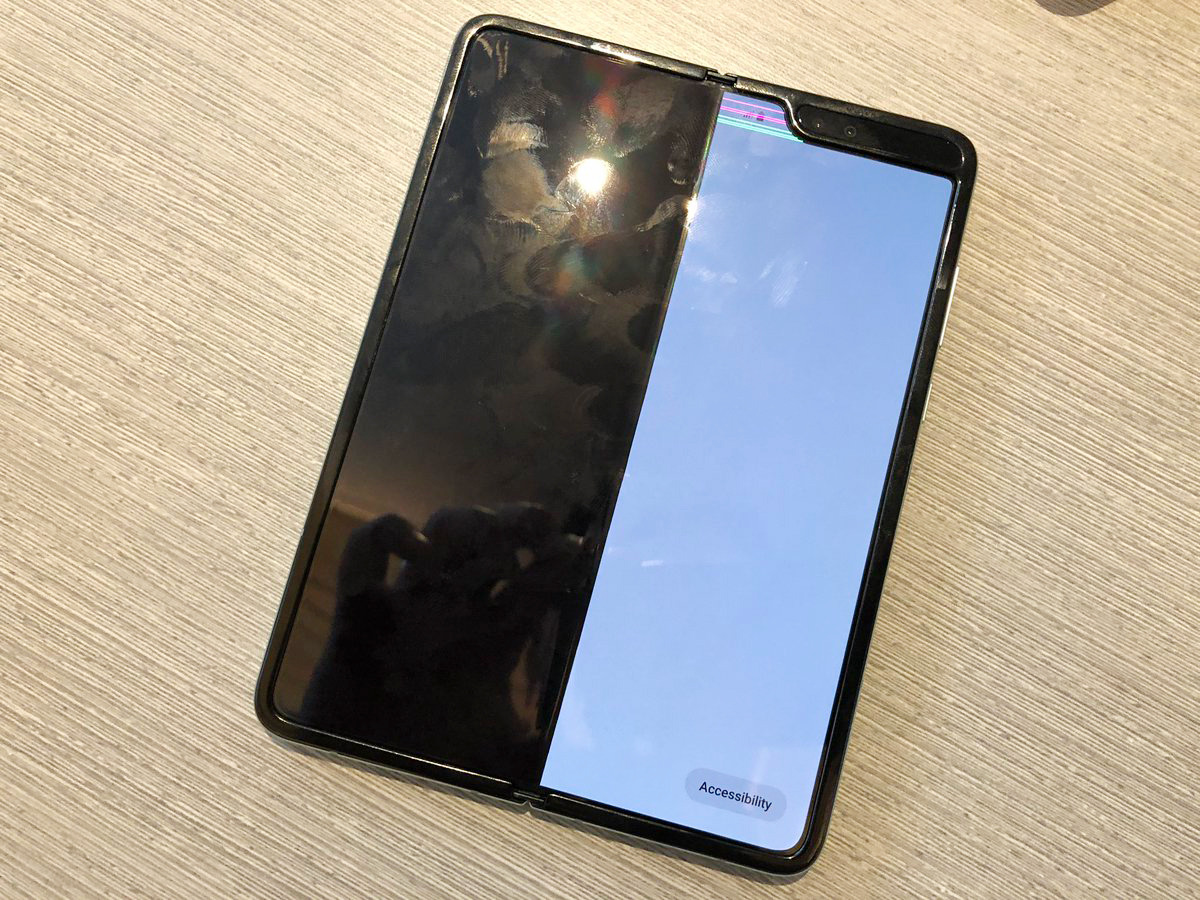

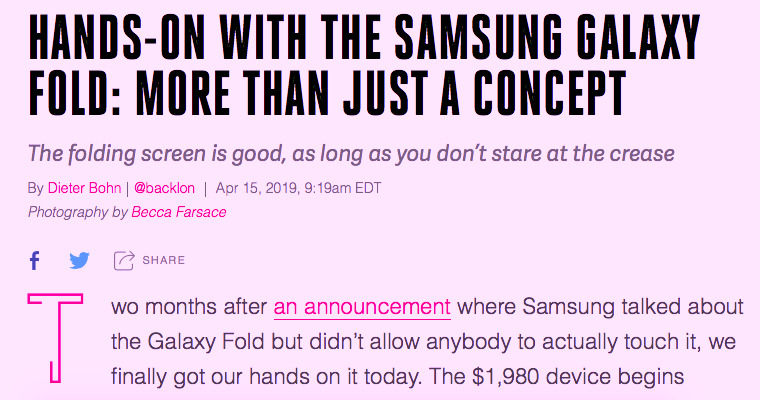
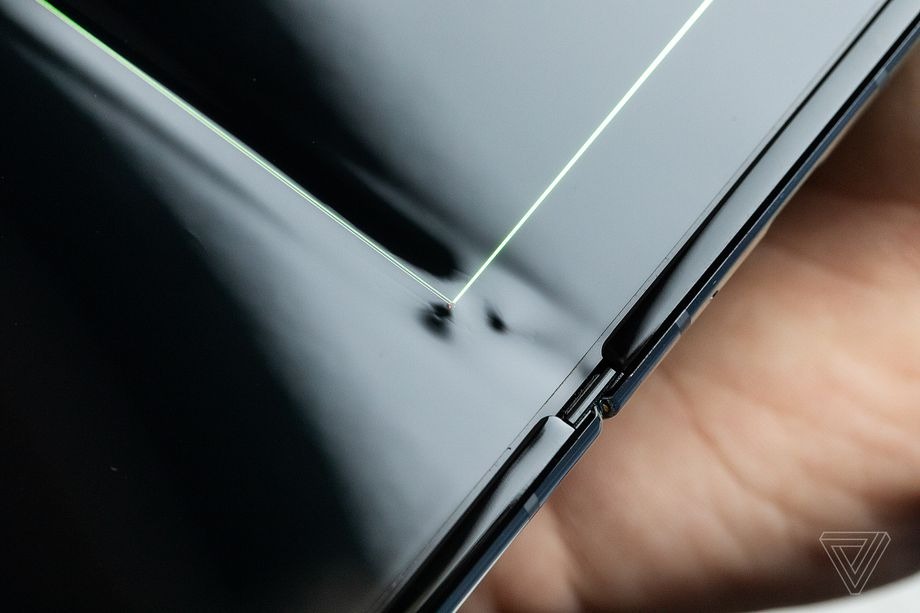
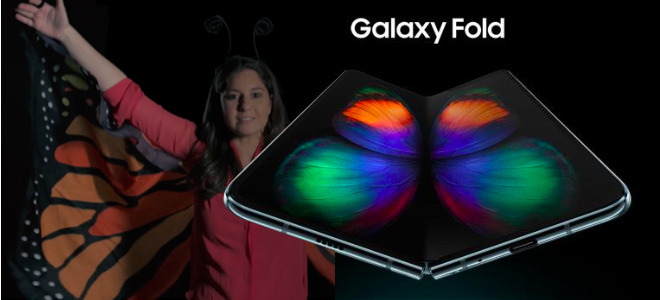

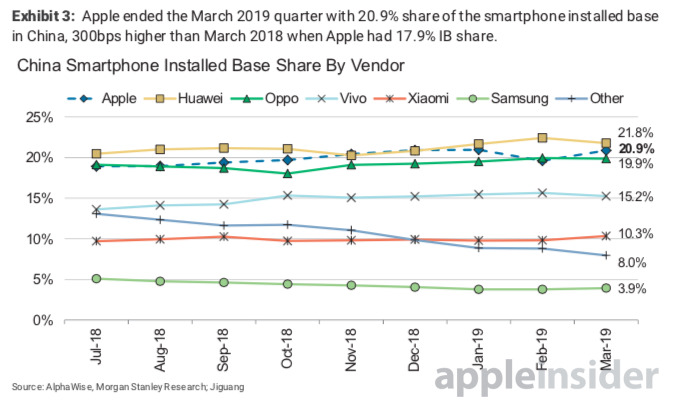











 Malcolm Owen
Malcolm Owen
 Chip Loder
Chip Loder

 William Gallagher
William Gallagher
 Christine McKee
Christine McKee
 Michael Stroup
Michael Stroup
 William Gallagher and Mike Wuerthele
William Gallagher and Mike Wuerthele







